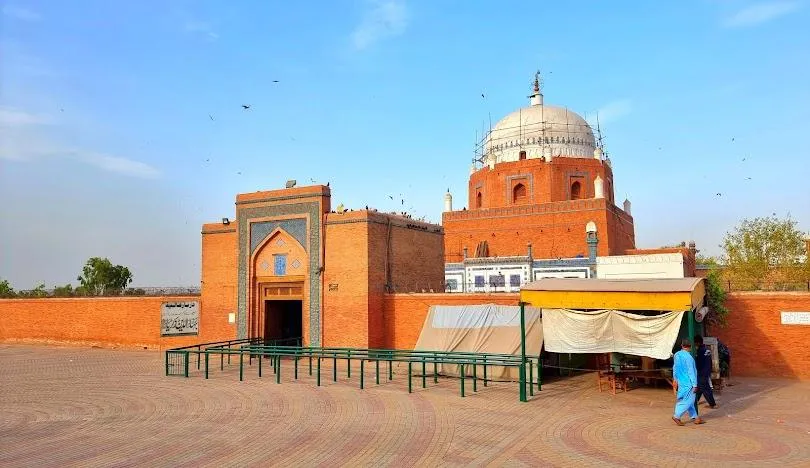MULTAN
City Of Saints
City Of Saints
Mausoleum of Baha-ud-Din Zakaria Multan
Mausoleum of BahaudDin Zakaria

Hazrat Bahauddin Zakariya, also known as Baha-ud-din Zakariya, was a prominent Sufi saint and scholar of the 12th and 13th centuries. His influence extends far beyond his lifetime, leaving an indelible mark on the spiritual and cultural landscape of South Asia. Born in 1170 in Kot Kehror, a town near Multan in present-day Pakistan, Bahauddin Zakariya is revered for his contributions to the Suhrawardiyya order of Sufism and his role in spreading Islamic teachings across the region.
Early Life and Education:
Bahauddin Zakariya was born into a family of scholars. His father, Wajih al-Din Muhammad, was a respected figure, and his mother was the daughter of Husam al-Din Tirmidhi .From a young age, Bahauddin Zakariya exhibited a keen interest in religious studies. He traveled extensively to seek knowledge, studying under various scholars and Sufi masters.His quest for spiritual enlightenment eventually led him to Baghdad, where he became a disciple of the renowned Sufi master Shahab al-Din Abu Hafs Umar Suhrawardi.
Establishment of the Suhrawardiyya Order in Multan:
In 1222, Bahauddin Zakariya settled in Multan, a city that would become the epicenter of his spiritual activities. He established a madrasa (Islamic school) and a khanqah (Sufi lodge) in Multan, attracting students and disciples from far and wide. His teachings emphasized the importance of inner purification, devotion to God, and service to humanity. Under his guidance, the Suhrawardiyya order flourished, and Multan became known as the "Baghdad of the East".
Spiritual Philosophy and Teachings:
Bahauddin Zakariya’s spiritual philosophy was deeply rooted in the teachings of his mentor, Shahab al-Din Suhrawardi. He believed in the concept of “wilayat,” or spiritual territory, where the influence of a Sufi saint extends beyond their physical presence. His teachings focused on the unity of God, the importance of following the Sharia (Islamic law), and the pursuit of spiritual excellence through self-discipline and meditation.
One of his famous Persian couplets reflects his deep connection to Multan:
Multan ma ba jannat a'la barabara
Ahista pa ba-nah ke malik sajda mi kunad
(Translation: Multan of ours is equal to high Paradise. Tread slowly, the angels are in prostration here.)
Contributions to Islamic Scholarship:
Bahauddin Zakariya was not only a spiritual leader but also a prolific scholar. He authored several works on Islamic jurisprudence, theology, and Sufism. His writings continue to be studied and revered by scholars and spiritual seekers alike. His emphasis on the integration of spiritual and worldly knowledge set a precedent for future generations of scholars.
One of its Famous Lines about him:
ملتانی مٹی کا عظیم فخر و شان
حضرت بہاؤ الدین زکریا کا بلند مقام
صوفی منش، دلوں کے راہبر
ہر دور میں ہے آپ کی عظمت کا کلام۔
The Shrine of Bahauddin Zakariya:
The shrine of Bahauddin Zakariya, located in Multan, is a testament to his enduring legacy. Built in
1262, the shrine is an architectural marvel and a significant pilgrimage site for devotees. The two-tiered structure, with its intricate tile work and majestic dome, exemplifies the distinct architectural style of southern Punjab. The shrine’s influence extends beyond its physical boundaries, with smaller shrines and spiritual centers spread throughout the region, forming a “wilayat” or spiritual territory.
Historical Significance:
The shrine of Bahauddin Zakariya has witnessed numerous historical events. During the Siege of Multan in 1848, the shrine was damaged by British cannonballs but was subsequently repaired. The shrine’s hereditary caretakers, known as “sajjada nashin,” have played a crucial role in maintaining the shrine and preserving its spiritual heritage.
Legacy and Influence:
Bahauddin Zakariya’s influence extends beyond the realm of spirituality. His support for Iltutmish, the Mamluk Sultan of Delhi, during the overthrow of Multan’s ruler Nasir-ud-Din Qabacha in 1228, highlights his political acumen and strategic vision. His alliance with other prominent Sufi saints, such as Lal Shahbaz Qalandar and Baba Farid, further solidified his position as a key figure in the spiritual and cultural landscape of South Asia.
Modern-Day Relevance:
Today, the teachings and legacy of Hazrat Bahauddin Zakariya continue to inspire millions. His emphasis on inner purification, devotion to God, and service to humanity resonates with people from all walks of life. The annual Urs (death anniversary) of Bahauddin Zakariya attracts thousands of devotees to his shrine in Multan, where they seek blessings and spiritual solace.
Short Words:
Hazrat Bahauddin Zakariya’s life and teachings are a beacon of light in the annals of Islamic history. His contributions to the Suhrawardiyya order, his scholarly works, and his enduring legacy as a spiritual leader have left an indelible mark on the spiritual and cultural fabric of South Asia. As we reflect on his life, we are reminded of the timeless values of love, compassion, and devotion that he embodied.
For those seeking to delve deeper into the life and teachings of Hazrat Bahauddin Zakariya, a visit to his shrine in Multan offers a profound spiritual experience. The shrine stands as a testament to his enduring legacy and serves as a source of inspiration for generations to come.
Frequently Asked Questions(FAQS)
Frequently Asked Questions(FAQS)
Who was Hazrat Bahauddin Zakariya?
Hazrat Bahauddin Zakariya (1170-1262) was a prominent Sufi saint, scholar, and poet from Multan, Punjab (present-day Pakistan). He founded the Suhrawardiyya order of Sufism in South Asia.
What is the Suhrawardiyya order?
The Suhrawardiyya is a Sufi order founded by Shahab al-Din Abu Hafs Umar Suhrawardi in Baghdad. Hazrat Bahauddin Zakariya established this order in South Asia, particularly in the Punjab region.
What were his main teachings?
His teachings emphasized the importance of adhering to Islamic practices such as fasting (roza) and alms-giving (zakat). He also advocated for a combination of scholarship (ilm) and spirituality, and he was known for teaching all humans regardless of class or ethnicity.
Where is his shrine located?
His shrine is located in Multan, Punjab, Pakistan. It is one of the most important shrines in southern Punjab and serves as a prototype for the region’s distinct architectural style.
What is the significance of his shrine?
The shrine of Hazrat Bahauddin Zakariya is a major spiritual and cultural site. It attracts numerous visitors and pilgrims who come to pay their respects and seek blessings.
How did his influence spread?
Hazrat Bahauddin Zakariya’s influence spread widely throughout southern Punjab and Sindh. His successors continued to exert strong influence over the region for several centuries, and his order spread further east into northern India.
We use cookies to ensure that we give you the best experience on our website.
© Copyright Multan 2024


Facebook
LinkedIn